#Wooler
Text
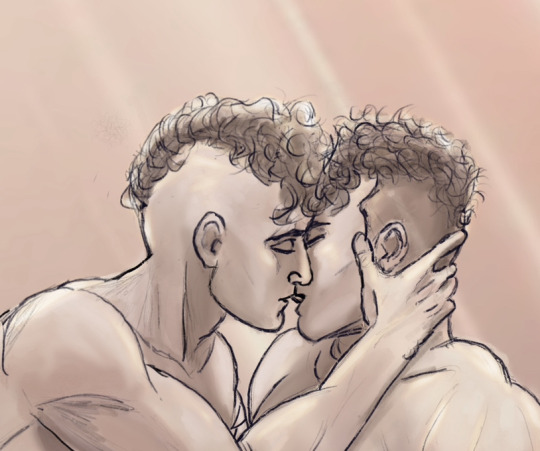
Wooley and Slasher spicy sketch. Full spice on Twitter
I’m in the process of creating an AO3 post for all my art, spicy and non spicy and I will create a pinned post with links. For now, or until Twitter completely implodes, I will link my spicy art to my Twitter.
#star wars#the clone wars#Wooley#Slasher#tcw slasher#arc trooper wooley#wooler#cloneshipping#clone ship#tcw#clone wars#Star Wars art#tcw art#Mel’s art#SPICY ART
112 notes
·
View notes
Text
Ivor Cutler
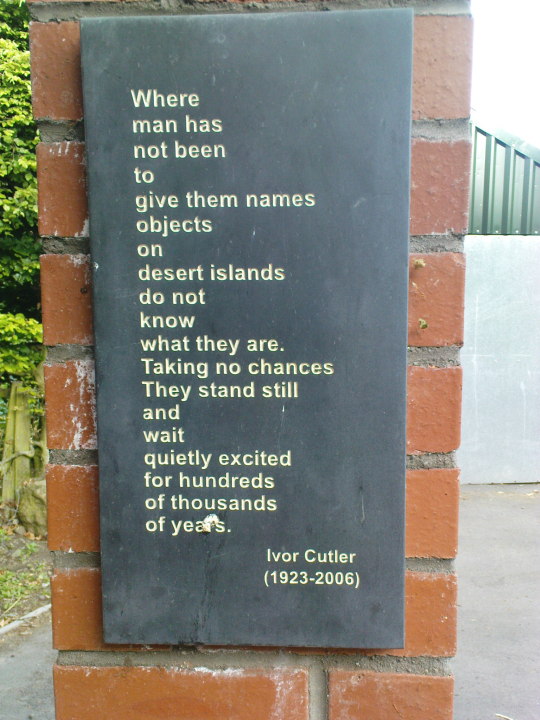
At the entrance to Wooler Youth Hostel, Northumbria, UK
4 notes
·
View notes
Text
Liverpool Music Roots: The Memorabilia Collection of Bob Wooler
Liverpool Music Roots: The Memorabilia Collection of Bob Wooler
3 August 1963, The Beatles played their last ever performance at The Cavern Club in Liverpool. During their set a power cut silenced their instruments and plunged the Cavern into temporary darkness. Lennon and McCartney performed an acoustic version of ‘When I’m Sixty-Four’, a song they wouldn’t release until 1967, while waiting for the electricity to return. The Beatles, whose fee for their…
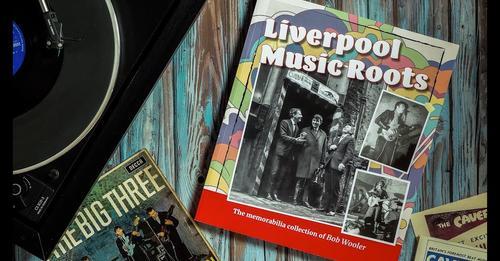
View On WordPress
0 notes
Text
Sam Leach and Joan McEvoy's Engagement Party, 17th March 1962 🕺💃
Earlier in the evening, The Beatles performed at the Village Hall in Knotty Ash, Liverpool. The evening was billed as a "St. Patrick's Night Rock Gala". Sam Leach, (Liverpool concert booker) booked The Beatles and Rory Storm and The Hurricanes to draw a big crowd so that he could make enough profits to pay for his engagement party, scheduled to follow the night's show. Both bands attended Leach's party, which didn't end until the following afternoon. Also present at the party was Mike McCartney, Paul's girlfriend Dorothy 'Dot' Rhone, Brian Epstein, Bob Wooler and Ted 'Kingsize' Taylor.
In his book Sam Leach has a distinct memory of 'a gang of us' (presumably including Beatles and Hurricanes) travelling to the party from Knotty Ash in a van. Their driver (not Neil Aspinall) pulled out from the Village Hall into the path of a speeding articulated lorry which seemed to have appeared from nowhere. Everyone braced themselves for the inevitable impact but miraculously the lorry, its brakes screeching hysterically, managed to stop less than a foot from the side of the van. Shocked, stunned, shaken and stirred, everyone in the van travelled the 1.5 miles to the party in complete silence.
Hurricane Johnny 'Guitar' Byrne diary entry for 1962 mentions the party:
"Bought Zodiac. Knotty Ash, Orrell, then Sam Leach's engagement party. Had row with Eileen. Got home 6."
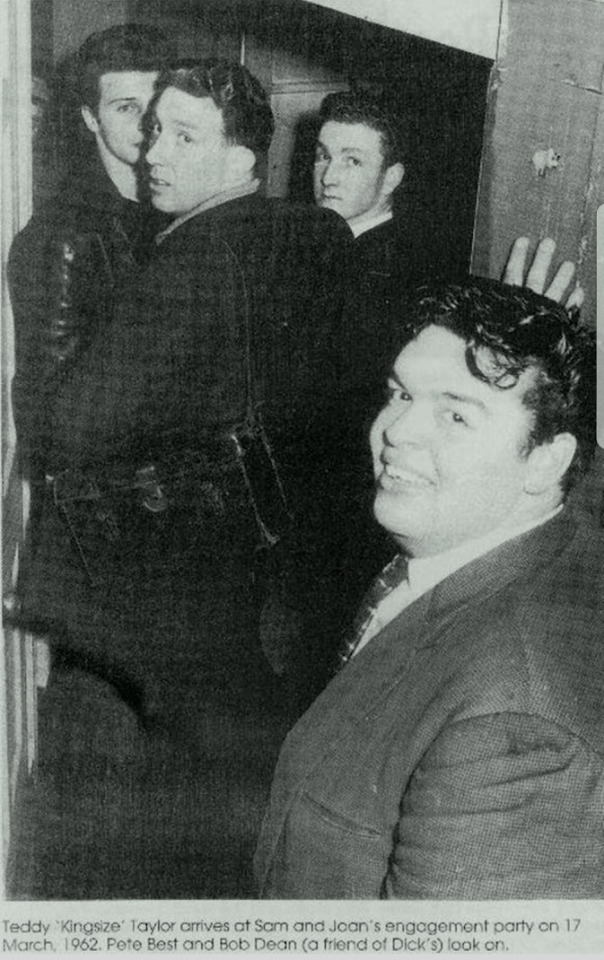
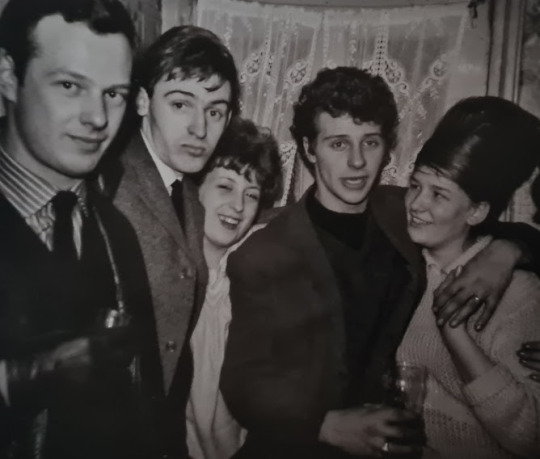
The party was at the family house in Huyton, thrown by Dolly, mother of Vera and Joan McEvoy.
"I can vouch for the fact that Brian fell in love with Vera and pursued her all night. In fact after the party he wrote more than one letter to Dolly asking her could she help him fix a date with Vera. Unfortunately for Brian she wasn't interested." Sam Leach (She seemed a little interested, as displayed below)
"Brown, who was married (but separated) at the time of her liaison with Epstein in 1962, describes him as "...very emotional. He always gave the impression of being cold and icy, but he was very softhearted, very tender, very gentle, and he had a lot of feelings. And he was all man, I don't care what they say." (Ray Coleman, The Man Who Made The Beatles)
"We’d been to the Knotty Ash Club for my sister’s engagement. The Beatles had played there, as did Rory [Storm] and a few other groups. Afterwards, as usual, we all went back to the house and Brian came along.
If you saw the Beatles in my mother’s they were just a scruffy bunch of boys. And who’d look at them? I wouldn’t bother with them but then Brian stood out and Brian looked like the real thing. He was handsome. He was tall. He was immaculate. That’s why I let Brian get behind the bar with me and help me serve the drinks. He was the best of the bunch.
So we were just behind the bar when Elvis came on, 'Heartbreak Hotel’. He loved it, I loved it, and we started dancing. There wasn’t much room. You know, you could go two steps forward, three steps back and that was it. So we sort of got a bit close and everyone was laughing at us, saying, like, 'What’s going on?’ But if you moved sideways you fell over the crates. There were crates of beer in there and everybody’s coats. We ended up on top of the coats or on top of the crates if we just moved the wrong way. And we got pretty close but I wasn’t surprised by the way he was acting towards me.
We were dancing and kissing at the same time. He was probably one of the sexiest fellas I had ever met. People say, 'Oh well, Brian was gay.’ but he wasn’t very gay with me. He was just like any other man and more. He was very easy-going and casual and funny. He’d make you laugh and he could dance. You know he could move. He said to me, 'I’ve seen you in different places and I thought you were stuck up.’ And I said, 'Well, I thought you were stuck up because I remember being in your shop and you were like the big boss.’
I think he was pretty fresh. In a house where people are looking at you it’s not like a club with all the lights out and people tend to be aware of others but Brian wasn’t that bothered. He was interested and he showed it. Maybe he’d had a bit too much to drink. I don’t know. But I can’t say that because I met Brian afterwards and he was still interested.
The next day he called round to the house. I wasn’t there so he talked to my mother about poetry. I don’t know how they got talking about poems but Brian came the following day with a book of poems for my mother with a little letter. He also gave her a letter thanking her for having the party because everyone had made such a terrible mess of the house. It was full of eggs and rubbish and bottles everywhere and he apologized for the actions of everybody else at the party.
Well, my mother just thought he was the most wonderful person in the world. At last a gentleman has come through this door and not Teddy boys and hooligans and all the rest of it. In the first letter he said he’d enjoyed meeting her, loved coming to the house, felt so welcome and would she mind if he came around again to see me. I said to my mum, 'Well, that’s impossible. How can I see him? You know I can’t go out with Brian.’ She said, 'You will have to’.
My mother was in love with Brian: 'He’s beautiful. He’s wonderful.’ So she sort of arranged it. I didn’t want him to come and pick me up at the house because I didn’t want people to see us going out. I arranged to meet him in a little cafe in Bold Street. We had a coffee and a chat and then I can’t really remember where we went. We went somewhere for a drink around Bold Street where there were all these little dives at the time. But I had to be back for nine o'clock. Another time I met him in the Tower and we had a little chat. We met in the back office and had a talk.
I liked Brian as a man and I think Brian liked me. But then he suggested if we were to go out we’d have to go to Southport or Manchester - anywhere out of Liverpool because he didn’t want to walk into my husband in Liverpool. We were separated at the time but it was a little bit awkward, you know.
It’s hard for me to believe Brian was gay. I think if I had been free and if I’d seen more of Brian I think we could have got serious. I think he was all man. I just can’t accept that he was gay.
In the shop Brian seemed like a man, like your dad shouting at you and superior. He had an attitude of superiority. But later on I discovered he was just like any other man. I thought he was a very passionate, loving person. He was like two different people. So if there’s a third person involved - this gay person - I just say he’s one hell of a man to be able to please everybody. You know, he was just unique. That’s all I can say." Vera Brown, In His Life, The Brian Epstein Story.
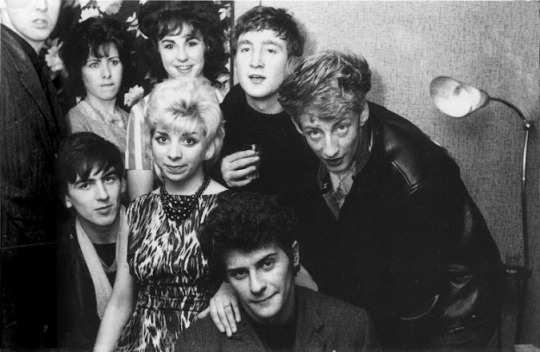


"George always fancied Joan and when I began dating her, he asked her to let him know when she finished seeing me. 'But don't tell Sam', he added. 'He’d batter me!' Today she probably feels like battering me for spoiling her chances." Sam Leach, The Rocking City
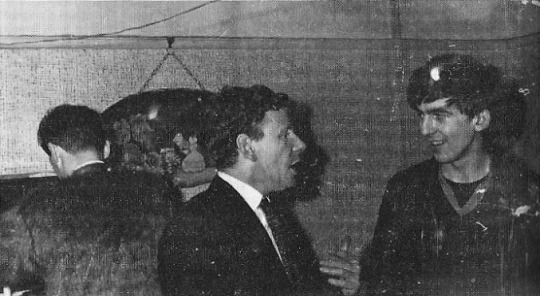

"Later in the evening, Joan had a headache and said she was going upstairs for a lie down. I went to fetch a couple of aspirins from the kitchen and said I'd follow her. Bob Wooler then made a typically cheap remark about pre-marital sex. Before I had a chance to sort him out, Paul and George grabbed him and made him personally apologise to Joan." Sam Leach, The Rocking City
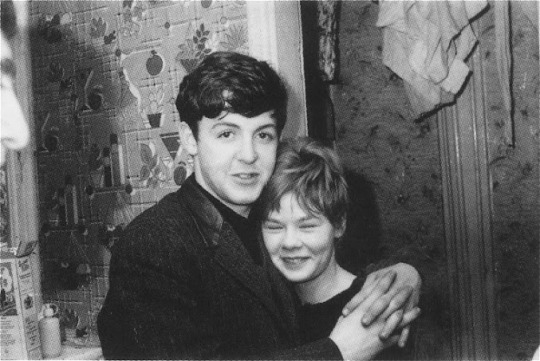
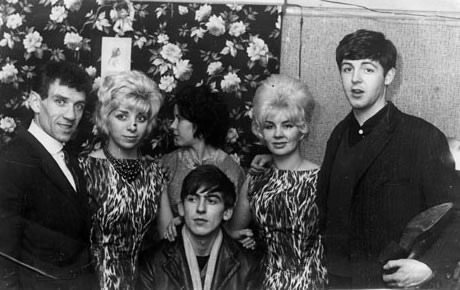
"Rory Storm was lying on the floor hopelessly drunk. He shouted up to Paul, 'I wanna be in the picture'. So, as you can see, Paul bent down and lifted his foot into the shot." Sam Leach
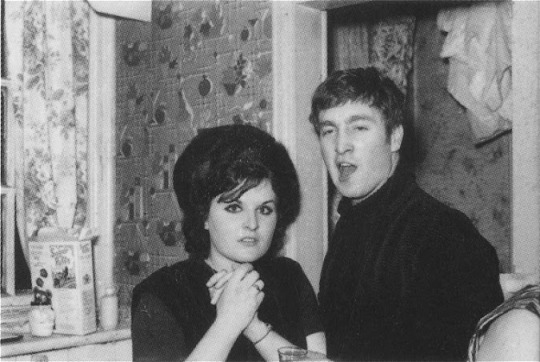
"The night rolled on and I found Lennon, completely sloshed, sitting in the kitchen rolling raw eggs down Ann Barton's birds-nest hairstyle. Each time one broke, he gave a gasp of astonishment at the gooey yellow mess spreading across the tiled floor. Dolly found out and gave him a severe rollicking, which sobered him up enough to utter a sincere, 'Sorry, Mrs Mac'. Everyone liked and respected Dolly McEvoy and that was the only time I ever saw Lennon genuinely humbled. He disappeared for a while after that and was found later fast asleep in the bath.
When he finally came downstairs, he once again started to apologise. Dolly had forgotten all about it, but he was still apologising as he left at nine the next morning. As we stood outside, he shook my hand gravely. 'That was the very best party I've ever been to . . . honest,' he croaked. I was pleased everyone had enjoyed themselves, but when John started thanking me for a third time, I put him in a taxi and packed him off home. As he left, I slipped an egg into his pocket. He never did tell me how that hatched out." Sam Leach, The Rocking City
#Paul McCartney#George Harrison#John Lennon#Pete Best#Sam Leach#photos by Sam Leach#quotes#Rory Storm#Joan McEvoy#Brian Epstein#Mike McCartney#Dot Rhone#Bob Wooler#Vera Brown#Ted Taylor#The Hurricanes#Paul#John#George#Brian
110 notes
·
View notes
Text

the stuff that screams are made of
#the beatles#paul mccartney#john lennon#george harrison#ringo starr#a bob wooler quote originally I think#{}
319 notes
·
View notes
Text
Lewisohn: rewriting history in the area where we trust him most – the songs performed
-In which Lewisohn rewrites a Beatles story and completely changes the songs sung, and coincidentally changes them in such a way so that if you know your Beatles trivia you'll think that Paul completely hogged the mic for two-thirds of the show-
Although I’ve come to a place where I’m more surprised to find a Lewisohn quote that turns out to be accurate than I am one that’s butchered, I have tended to believe that he is trustworthy on things like dates and songs performed. I’ve felt like that’s probably his anchor, and that he shapes the rest of his narrative around that.
But perhaps the habit of taking license cannot help but spread into other areas, because I am discovering that neither dates nor song lists turn out to be sacred with Mark Lewisohn.
As far as dates, that is part of a bigger piece that has been tangling me up for a few weeks, but his version of “the Beatmakers” performance shows that Mark Lewisohn will write what he wants, and that he has zero compunction in changing history to suit himself, regardless of subject.
In Chapter 22: “Right then, Brian — Manage Us,” a primary theme is that every promoter was done with the Beatles when Brian Epstein came along. Brian Kelly, especially, is given the role of being fed up with them, and Lewisohn uses “the Beatmakers” performance—Gerry and the Pacemakers and the Beatles going on stage together—as an example of how bad everything was just before Brian stepped in. (I do believe that Brian was a godsend, but that doesn’t mean that Lewisohn’s narrative is supported in every area, and in some places he stretches a lot more than in others. This is definitely one of those areas.)
Here’s the story: before going to the Litherland Town Hall performance, Bob Wooler had been drinking, maybe with the Beatles, and in Lewisohn’s version, Gerry seeing that they were all drunk sent “Gerry Marsden scuttling to the pub around the corner.” Every telling I’ve seen, one way or another, is in agreement that Gerry Marsden as well as Wooler had been drinking, and that the Pacemakers and the Beatles all played together with Wooler introducing them as “the Beatmakers.” Lewisohn adds some highly unlikely Preludin into the mix—“John, pissed and pilled…”—but I’m not going to take that on here.
Along with the chance to tell a riotously colorful story—one that in Lewisohn’s telling goes much farther than any of the source materials I’ve found—the main point of the tale is for Wooler to give us the climax of the—(all unsourced, other than this single, butchered Wooler quote)—frustration Lewisohn tells us promoter Brian Kelly was feeling: “Brian Kelly was fraught with anxiety over it. It was only a short episode and a bit of a shambles.”
The quote by Wooler that Lewisohn uses to try to prove his point, and the one and only reference he gives to support any of his “Brian Kelly fed up/Epstein must save Beatles” narrative is a modification of one of those Lewisohn monsters I call a “donut.” (There’s a hole in the middle. However in this case, as in many others, he also adds words that were never spoken.)
THE ACTUAL WOOLER QUOTE:
“Brian Kelly was fraught with anxiety over it, but the audience liked it. It was a bit of a shambles really, so I lowered the curtain on the proceedings.”
LEWISOHN’S REWRITE:
“Brian Kelly was fraught with anxiety over it. It was only a short episode and a bit of a shambles.”
And while I am very interested in what Lewisohn is using for his Brian-Epstein-saved-the-Beatles-but-Paul-tried-to-thwart-him narrative, I felt the need to pause to look at Lewisohn’s massive and nonsensical alterations to this performance, especially in the songs the improvised combo-band played. (And yet how very authoritatively Lewisohn does it.)
The whole section has problems, but let us deal with the songs.
Mark Lewisohn says they “thundered through four numbers”—
The Beatmakers thundered through four numbers—“Whole Lotta Shakin’ Goin’ On,” “What’d I Say” (extended mix), “Red Sails in the Sunset” and the new Ray Charles record “Hit the Road Jack”—during which John, pissed and pilled, slid from the piano and slumped on the stage.
—‘Tune In,’ Lewisohn – Chapter 22 (Emphasis mine.)
Sticking to the songs, the page referenced in the footnote first quotes Bob Wooler:
“They did a few numbers like ‘Hit The Road Jack’, swopping instruments and the like.”
—FOOTNOTE 9: ‘The Best of Fellas’ – Bob Wooler (Emphasis mine)
Then the next paragraph quotes Gerry Marsden, and I’m going to add boldface to the songs he says they played:
“It worked very well as we all knew the same songs and all played the same songs. Paul, John and I took turns on the piano and Les played the sax. We did ‘Roll Over Beethoven’, ‘Johnny B. Goode’, ‘Great Balls Of Fire’, ‘Pretend’, ‘Blueberry Hill’, ‘I’m Walkin'’ and ‘Sweet Little Sixteen’, probably some others too.”
—FOOTNOTE 9: ‘The Best of Fellas’ – Gerry Marsden (Emphasis mine)
So, either they performed exactly four numbers, including an “extended mix” of Paul wailing ‘What’d I Say,’ —or— they performed at least eight numbers and “probably some others, too.”
“The Best of Fellas” version from Bob Wooler and Gerry Marsden that is referenced in the footnote makes sense in ways that Lewisohn’s rewriting doesn’t. Marsden begins by saying that they all knew the same numbers, and moreover what Lewisohn is telling us is that Paul took over the mic for three out of four numbers, and went so far in his spotlight-hogging selfishness as to sing an “extended version” of ‘What’d I Say.’ It’s a particularly egregious “if you know, you know” insertion that conjures up a very damning image of Paul in this otherwise “mutual mood of cooperativeness.” But not only is Lewisohn’s song list not supported, if Paul had hogged the spotlight that way it’s only reasonable to believe that Marsden would have remembered that, and certainly wouldn’t have described the collaboration in the way he did. And if Paul was hogging the mic and spotlight and had sung song after song where he was the lead, Marsden absolutely, positively, would not have rolled off a list of songs that didn’t include a single, solitary Paul song. That is simply beyond belief.
Gerry Marsden’s recollection also makes a lot of sense in that it’s natural that he would best remember the songs where he sang lead. And indeed, out of the seven songs he names, four are Pacemakers’ songs. (Including the one Wooler names and Lewisohn decides to agree with: “Hit the Road, Jack.”) And none of the songs anyone names are songs where Paul sings lead. Two are John songs and the other is a George song, which lends credence to Gerry Marsden’s “probably some others, too” comment, because it’s likely that there was at least one song where Paul was lead.) But in Lewisohn’s seemingly fabricated four-song list, other than “Hit the Road, Jack” they’re all Paul numbers. So not only does Lewisohn choose to have Paul singing an extended version of a scene-stealing “What’d I Say” but he slyly tells us that Paul basically hogged the microphone for seventy-five percent of the numbers (and even more of the time) that this “cooperative” was on stage together. Now, if you’re not a hardcore fan with a fair amount of knowledge this will probably slip past you, but if you’ve got a dog in this hunt, and especially if you already think Paul McCartney is a self-obsessed prima donna, you’ll get the picture Lewisohn is so deliberately painting. And I write deliberately very—well, deliberately—because if a writer makes the decision to veer away from the record and create a very specific, very limited, and very fictional song list for an anecdote about two groups deciding to get together and sing, and more than two-thirds of the songs chosen for the historical rewrite are Paul songs—and then that writer even goes to the trouble of telling readers that Paul sang an “extended mix” of one of those songs—then of course it’s deliberate. Lewisohn didn’t choose his reinvented song list at random out of a Bingo cage.
Here are the songs referenced in the footnote versus the songs that Lewisohn says they sang.
SOURCE MATERIAL SONG LIST/USUAL LEAD:
“Hit the Road Jack” ✓ /Gerry Marsden
“Roll Over Beethoven”/George
“Johnny B. Goode”/John
“Great Balls Of Fire”/Gerry (and Paul?)
“Pretend”/Gerry Marsden
“Blueberry Hill”/Gerry Marsden
“Sweet Little Sixteen”/John
“I’m Walkin'”/Gerry Marsden
LEWISOHN’S SONG LIST/USUAL LEAD:
“Hit the Road Jack” ✓ /Gerry Marsden
“Whole Lotta Shakin’ Goin’ On”/Paul
“What’d I Say” (extended mix)/Paul
“Red Sails in the Sunset”/Paul
----
P.S. If you haven't been reading all of @wingsoverlagos 's work, you absolutely have to. She's done so much and Lewisohn's inventions are so much worse than I realized.

#the beatles#beatles#mark lewisohn#lewisohn is making stuff up again#dr frankenquote#lewisohn#the beatmakers#bob wooler#fine tuning#tune in#paul mccartney#john lennon#gerry and the pacemakers#the best of fellas
31 notes
·
View notes
Text


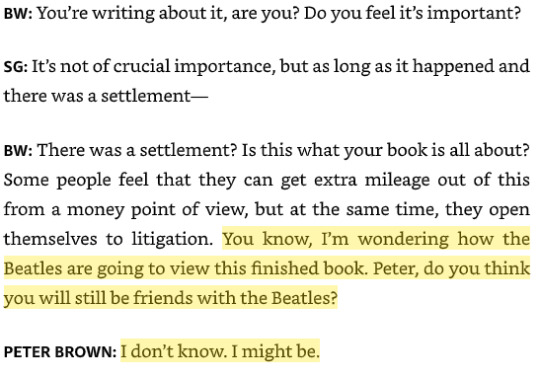
photos taken moments before disaster
12 notes
·
View notes
Text
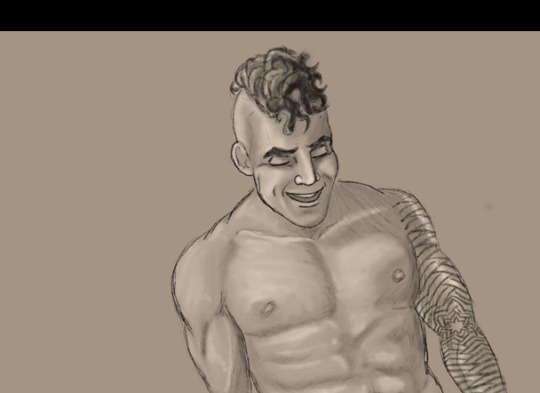
Some very cute very spicy Wooley/Slash art, full spice version posted at AO3
#wooley#slasher#wooler#the clone wars#star wars#tcw#cloneship#cloneshipping#clone wars#mel’s art#tcw art#the clone wars art#spicy art#tcw slasher#arc trooper wooley#clone medic slasher
42 notes
·
View notes
Text
12 December 1962
Bob Wooler goes onstage at the Cavern to tell the audience that, due to a winter storm, one act will not be appearing this evening.
That act, however, is not the Beatles but some folk duo so no one cares.
20 notes
·
View notes
Text
Really obsessed with the way Mark Lewisohn frames the Paris trip
John’s 21st birthday was a month away … his idea was to go away with Paul and enjoy it. Bob Wooler was party to their planning, and fought with them:
“They were bored, and decided they would go away for a month. I thought this was disastrous because they would be away from the scene too long and lose their fans. Fans were very capricious: they moved from one group to another. And anyway, what about the other two members, George Harrison and Pete Best? What about them, what do they do? We argued a lot about this …”
… all bookings from September 30 to October 15 had to be broken—an unpleasant job for Pete; he and George had to accept losing up to £50 apiece, as well as being left behind. John said George “was furious because he needed the money,” and it’s unlikely Paul extended George much sympathy …
… The promoters who paid the Beatles over-the-odds to present them every week had to “lump it” … they were incensed by it—but John and Paul hadn’t a care …
It was tough too on Dot and Cyn … That John was taking Paul, no one else, accentuates the renewed closeness since Stu quit the Beatles … [Bob Wooler said] “At times, they reminded me of those well-to-do Chicago lads Leopold and Loeb, who killed someone because they felt superior to him. Lennon and McCartney were ‘superior human beings.’”
-- MARK LEWISOHN, TUNE IN: THE BEATLES: ALL THESE YEARS (2013)
#NOT THE GAY SERIAL KILLERS COMPARISON!!!#i've read that quote before but i hadn't known the context until just now#can't stand mclennon....toxic duo of all time....#tune in#mark lewisohn#the beatles#mclennon#bob wooler#john lennon#paul mccartney
196 notes
·
View notes
Text
August 31, 1961: Bob Wooler predicts the Beatles’ future in Mersey Beat
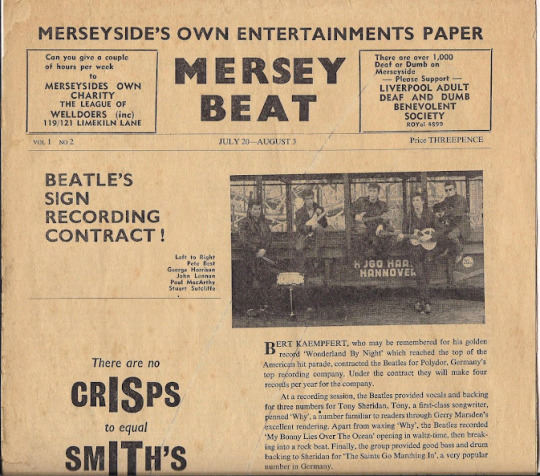
A PHENOMENON CALLED THE BEATLES!
by Bob Wooler [x]
Why do you think The Beatles are so popular? Many people many times have asked me this question since that fantastic night (Tuesday, December 27th, 1960) at Litherland Town Hall, when the impact of the act was first felt on this side of the River. I consider myself privileged to have been associated with the launching of the group on that exciting occasion, and grateful for the opportunities of presenting them to fever-pitch audiences at practically all of the group’s subsequent appearances prior to their last Hamburg trip.
Perhaps my close association with the group’s activities, both earlier this year and since their recent reappearance on the Merseyside scene, persuades people to think that I can produce a blueprint of The Beatles Success Story. It figures, I suppose, and if, in attempting to explain the popularity of their act, the following analysis is at variance with other people’s views, well that’s just one of those things. The question is nevertheless thought-provoking.
Well then, how to answer it? First some obvious observations. The Beatles are the biggest thing to have hit the Liverpool rock ’n’ roll setup in years. They were, and still are, the hottest local property any Rock promoter is likely to encounter. To many of these gentlemen’s ears, Beatle-brand noises are cacophonous on stage, but who can ignore the fact that the same sounds translate into the sweetest music this side of heaven at the box office!
I think The Beatles are No. 1 because they resurrected original style rock ’n’ roll music, the origins of which are to be found in American negro singers. They hit the scene when it had been emasculated by figures like Cliff Richard and sounds like those electronic wonders The Shadows and their many imitators. Gone was the drive that inflamed the emotions. This was studio set jungle music purveyed skillfully in a chartwise direction by arrangement with the A & R men.
The Beatles, therefore, exploded on a jaded scene. And to those people on the verge of quitting teendom—those who had experienced during their most impressionable years the impact of rhythm ’n’ blues music (raw rock ’n’ roll)—this was an experience, a process of regaining and reliving a style of sounds and associated feelings identifiable with their era.
Here again, in The Beatles, was the stuff that screams are made of. Here was the excitement—both physical and aural—that symbolized the rebellion of youth in the ennuied mid-1950’s. This was the real thing. Here they were, first five and then four human dynamos generating a beat which was irresistible. Turning back the Rock clock. Pounding out items from Chuck Berry, Little Richard, Carl Perkins, The Coasters and the other great etceteras of the era. Here they were, unmindful of uniformity of dress. Unkempt-like long hair. Rugged yet romantic, appealing to both sexes. With calculated naivete and an ingenious, throw-away approach to their music. Affecting indifference to audience response and yet always saying “Thank-you.” Reviving interest in and commanding enthusiasm for numbers which descended the Charts way back. Popularizing (more than any other group) flipside items—example, “Boys.” Compelling attention and influencing, wittingly or unwittingly, other groups in the style, choice and presentation of songs.
Essentially a vocal act, hardly ever instrumental (at least not in this country), here they were, independently minded, playing what they liked for kicks, kudos and cash. Privileged in having gained prestige and experience from a residency at the Hamburg Top Ten Club during the autumn and winter of last year. Musically authoritative and physically magnetic, example the mean, moody magnificence of drummer Pete Best—a sort of teenage Jeff Chandler. A remarkable variety of talented voices which song-wise sound distinctive, but when speaking, possess the same naivete of tone. Rhythmic revolutionaries. An act which from beginning to end is a succession of climaxes. A personality cult. Seemingly unambitious, yet fluctuating between the self-assured and the vulnerable. Truly a phenomenon—and also a predicament to promoters! Such are the fantastic Beatles. I don’t think anything like them will happen again.
———
Retrospective from Bill Harry, Editor of Mersey Beat [x]
Editor’s note: Cavern disc jockey Bob Wooler, a Mersey Beat columnist, penned this piece in the August 31 1961 issue of Mersey Beat. How prophetic his last sentence proved to be! In recent years I told Bob I intended to revive Mersey Beat and I wanted him back in the fold as a columnist. Sadly, he died early in 2002 while I was still panning the website.
There are one or two things I would like to point out. The main advertisement on this page was for NEMS record store. Apart from the fact that I regularly discussed the Beatles and the Mersey scene with Brian Epstein each time I dropped copies to him, in addition to the fact that he began to review records for me from Issue No. 3, it is obvious from the sort of coverage, such as this article, which the Beatles were receiving every issue, that Epstein was aware of the Beatles from Mersey Beat and not some youngsters asking for a record in his store some months later. Bob also mentions the impact the group made at Litherland Town Hall. It was Bob who persuaded promoter Brian Kelly to book them for their debut appearance there on that date. It's also interesting to note that the only member of the Beatles mentioned by name is drummer Pete Best. Bob nicked the 'mean, moody, magnificent' tag from Howard Hughes' description of Jane Russell in the movie 'The Outlaw.' As this article was published in 1961, Bob did get something wrong: he mentions a residency at the "Hamburg Top Ten Club during the autumn and winter of last year." They only had residencies at the Indra and Kaiserkeller in 1960, although they made a few appearances at the Top Ten (Their Top Ten residency didn't actually commence until 1961).
#the beatles#bob wooler#1961#mersey beat#august 1961#newspaper clippings#beatles and the press#the humble beginnings#as transcribed in tune in#havent seen this one anywhere on here#been looking for the clipping but havent found it#if youve seen it give a shout#oh found the copy on the mersey beat archives#have to get bill harrys note bc its a great example of how a good story works#not a clipping tho so an august beatles cover is the closest i can get#litherland#december 1961#hamburg era#brian epstein#bill harry#ran into crit bill harry got from other liverpool bands during the early merseybeat days bc he would write so much about the beatles#so its impossible the beatles had missed brians radar before the my bonnie record request#‘beatles sign recording contract’ aww they mean the german label printed my bonnie how cute
25 notes
·
View notes
Text
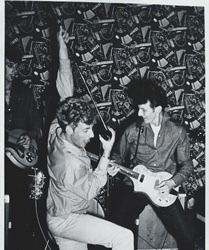
Rory Storm and Johnny Guitar, possibly 1961 in Butlins
“Rory Storm was far more show than substance. He learnt his tricks from watching Elvis Presley and Gene Vincent. He had little originality but was a very good copycat. He would cock his leg over the mike like Gene Vincent and cover his songs like ‘Rocky Road Blues’. I will never forget him knocking the Reslo mike over at Holyoake: his foot hit the mike, which was the only one we had. I thought, ‘Oh god, I hope he hasn’t ruined it’, and, fortunately, he hadn’t. I told him that he must never do that when we are down to one mike. If you glanced at some of the early photographs of Rory Storm doing tricks with his mike stand, you might think it was a young Rod Stewart.” - Bob Wooler
14 notes
·
View notes
Text
Wednesday 19 June
Brian Epstein told John to send the injured Wooler a telegram apologising for his behaviour. It read, ‘Really sorry Bob. Terribly worried to realise what I had done. What more can I say?’ The group, minus John, took the train to London to record their second appearance on Easy Beat at the Playhouse Theatre. Epstein told a contrite John he had to go, packing him off on a later train.
Maureen O’Grady spoke with Paul, George, Ringo and Brian Epstein before the recording. John finally arrived with Cynthia, who was dressed in black from head to toe and wearing dark glasses. The session lasted from 8.45pm to 9.45pm and the group performed ‘Some Other Guy’, ‘A Taste Of Honey’, ‘Thank You Girl’, and ‘From Me To You’. An attack of the giggles meant they had to record everything twice. The show aired the following Sunday.
Thursday 20 June
John’s telegram was sent from Covent Garden at 6.10pm to Wooler at his flat in Canning Street, Liverpool.
Friday 21 June
The latest NME carried a thank you from Paul in the form of an ad, which cost him £ 15: ‘TO MANY PEOPLE-Thank you very much for your Gifts and Greetings on my Birthday… Great! PAUL McCARTNEY!”
The Beatles 1963 by Dafydd Rees
*
Eight years later I know, but was Too Many People also a sort of call back to this week, where John had been a mess at Paul’s 21st? Also I’ve only just noticed ‘too many people’ is an aural pun.
#the beatles#paul mccartney#john lennon#george harrison#ringo starr#the beatles 1963#too many people#dafydd rees#bob wooler#NME
31 notes
·
View notes
Text
Bob exploded when he saw this: "This is preposterous," he said, "Absolute nonsense. Goldman sees that the party was in the garden and rushes to the conclusion that all the garden implements are to hand. He'll have me buried in the rose bushes next."
Bob Wooler's reaction to Albert Goldman's telling of the fight with John. (From The Best of Fellas, Spencer Leigh)
11 notes
·
View notes
Text
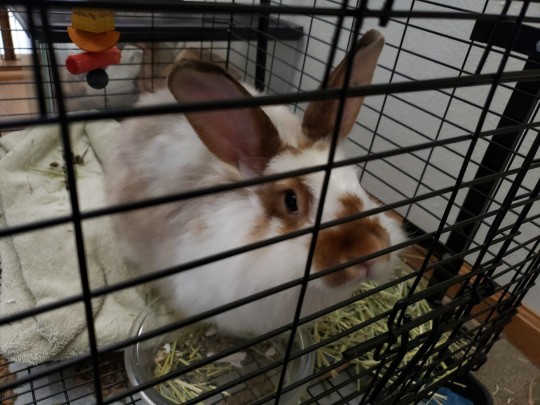
It's too hot out for her to stay in the mousery so poor Angel baby has to live in a travel cage in the house for a few days :(
#this weekend will be over 100#the garage will be about 80#too hot for a wooler#might just have to take the mice in too
48 notes
·
View notes
Quote
Brian Epstein was fond of giving away bottles of Johnnie Walker whisky. [...] When Brian came out with a bottle for the manager of the Queen’s Hall, Widnes, the manager’s face dropped and he said, ‘I’m sorry, I can’t accept this. This is a Methodist Hall, and we restrict all alcohol on the premises. I hope there is no liquor backstage on your presentations.’ To his credit, Brian made a very quick recovery, ‘No, of course not. There’s nothing like that.’ Brian said afterwards, ‘What do you think of that?’, and I said, ‘It’s a pity to waste Johnnie Walker.’ He said, rather like a naughty schoolboy, ‘Then we’ll have one backstage.’
Bob Wooler (The Best of Fellas - The Story of Bob Wooler by Spencer Leigh)
36 notes
·
View notes